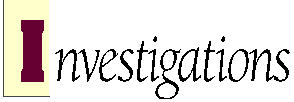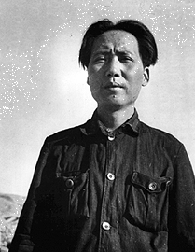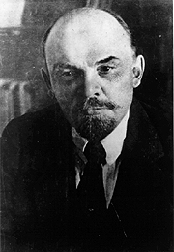 The University of Chicago Magazine June 1996
The University of Chicago Magazine June 1996



 Scary pushovers: Khomeini, Mao, and Lenin, says the U of C's Stephen Walt, evoked similar international reactions: "Oh my God, they're dangerous--but we can get rid of them quickly."
Scary pushovers: Khomeini, Mao, and Lenin, says the U of C's Stephen Walt, evoked similar international reactions: "Oh my God, they're dangerous--but we can get rid of them quickly."
In a far republic, a revolution finally topples the old regime. The nationalists (or perhaps the Marxists, the liberal capitalists, the religious fundamentalists) now run the show, and their oppressor's allies are branded de facto enemies. Neighbor nations fear the revolution will spread; some states even see a chance for conquest in the present chaos. When others react defensively to such opportunism, a zealous faction within the revolution interprets the move as aggression and, in hopes of shoring up its domestic position, pushes for a military response. As the cautious neighbors prepare for battle, the faction's cocksure leaders gain power at home. Third-party diplomatic efforts only muddy the waters. War looks inevitable.
Political scientist Stephen Walt knows the scenario inside and out. Wars, he notes, touched the new revolutionary republics of France in 1792, Russia in 1918, China in 1950, and Iran in 1980-each time preceded by a similar spiral of events. Walt sees a logic to the international conflicts that often follow the violent creation of a state. The newly established government and other powers exaggerate the threat that they pose to one other. Worse yet, they exaggerate the ease of a military solution to those threats. Bloodshed follows, Walt argues in Revolution and War (published this spring by Cornell University Press), from this "bizarre combination of optimism and paranoia."
Many political scientists believe that revolutions spark wars by shifting the balance of power. And in part Walt shares that perspective, called realism, which sees the need for international security as the driving force behind states' behavior. But Walt focuses equally on nations' perceptions of the power balance, and so gives weight to domestic factors: beliefs about whether an ideology will spread, the misinformation that accompanies revolution, and opinions of the new state's fighting strength. These ingredients provide the optimism and paranoia that fuel spiraling conflicts. "Instead of getting a nice, two-week-long war in which the enemy collapses," he says, "you get things like the wars of the French Revolution, which lead to the Napoleonic Wars--some 20 years of incessant warfare."
Not that war is always the result, as the aftermath of the Turkish, Mexican, and U.S. revolutions demonstrates. In his book-a seven-year project that fits well with his preference for "big theoretical questions in the real-world public debate"--Walt analyzes the effect of these revolutions and those of France, Russia, China, and Iran. In the former, stabilizing elements such as less expansionist revolutionary ideologies helped avert a major international clash. Yet the dynamic of misperception and fear, he notes, still shaped relations among states.
Many wars, he says, spring in part from unquestioned assumptions that revolution is easy to export or to overthrow. "Armies are good ways of spreading revolution"--as the Soviets proved in Eastern Europe, notes Walt--"and those efforts ought to be opposed. But subversive, ideological movements--those methods don't seem to be particularly successful." Too often, he adds, countries fearing subversion embark on "a preemptive military response," as Iraq did toward Iran in 1980, leading to eight years of war and one million casualties.
Walt believes containment, as shown by NATO's cold war-response to the USSR, may steer a wise middle course between embracing a revolutionary regime and trying to overthrow it. Yet U.S. policy has typically stayed nearer the second route: Interventions in revolutionary Mexico, Russia, China, Cuba, and Nicaragua exemplified the optimism-paranoia pattern and risked escalating conflicts.
Yet "no [country] seems to figure it out at the time," he observes. Among the most intriguing propositions of Revolution and War: "The miscalculations that surround a revolution are somewhat unavoidable." Not surprisingly, human machinations are at work. A revolution's exiled opponents can mislead foreign governments with their lobbying efforts; at home, the support of the masses is hard to gauge. Any sympathy shown for the cause, Walt notes, might either be "the tip of the iceberg, or just an isolated bunch of fanatics." Thus the "inherent unknowability of contagion."
Walt hopes that the pattern he's identified has a "timeless relevance," but it may be timely as well. In the aftermath of the USSR's collapse, its former republics exhibit "ideal conditions" for post-revolutionary war: renewed nationalisms that play up historical fears, competing agendas and unstable balances of power, and a mutual overconfidence of success. Recall, he says, "the Soviets going into Chechnya, thinking it's going to take two weeks."
Stephen Walt has a lesson, too, for Americans forgetful of their roots. "Many of the same dynamics that are happening between the U.S. and revolutionary Iran," he points out, "were happening [in the 1790s] between Britain or France and the United States"-like miscommunications with the nascent regime and worries about the spread of its new ideology. "We tend not to think of the founding fathers as even remotely like the Ayatollah Khomeini, and I wouldn't want to push that parallel, but the fact is, within the international system they had somewhat similar effects."--A.C.